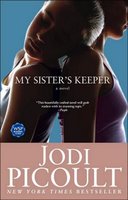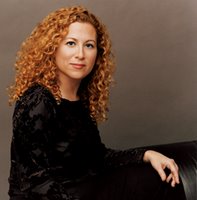 My Sister's Keeper
My Sister's KeeperJodi Picoult
I've started a reading club with my English classes; although it isn't much time, I give them about 30 minutes a week to read anything they want. On one such day, about five students were reading My Sister's Keeper. They gushed about "how amazing" it is, and how I "so have to read it." I admit, I was intrigued, and I decided to try one of their selections on for size, since I expect them to read all of mine.
Surprisingly, I really liked it. My Sister's Keeper is the story of a family torn apart by one member's illness. Brian and Sara had two lovely children, Jesse and Kate; having one boy and one girl, their family was "complete." Unfortunately, one day, Kate was diagnosed with a rare form of leukemia, and was not given a good prognosis. No family members were a match who could donate important stuff like white blood cells and other gross stuff I'd rather not think about, so Brian and Sara had another child, a child genetically ensured to be an exact match for Kate. Thus, Anna was born, a child who would never had lived had not Kate gotten ill and needed a donor. The novel begins when Anna, now a young teen, decides she's tired of being poked and prodded, and enlists a lawyer to sue for medical emancipation from her parents.
Surprisingly, Picoult can actually write. This is interesting because in an interview, Picoult has said one of her favorite contemporary authors is Alice Hoffman, a writer whose work I don't particularly find to be...what am I looking for...oh, I know...any good. So I lumped Picoult in with those woman-writers who write weepy-type women books that aren't literary in the least but are mildly entertaining.
 Well, I was both right and wrong on that front. Her work isn't exactly literary per se, but she does write very well, and her ability to tell a story is much better than that of her mentor, Hoffman. Each chapter is narrated from a different character's perspective, beginning with Anna, then Campbell (her lawyer), then moving on to Sara, etc.
Well, I was both right and wrong on that front. Her work isn't exactly literary per se, but she does write very well, and her ability to tell a story is much better than that of her mentor, Hoffman. Each chapter is narrated from a different character's perspective, beginning with Anna, then Campbell (her lawyer), then moving on to Sara, etc. My only beef is that the voice didn't alter much from character to character; Jesse, for example, used more profanity than, say, Anna, but otherwise it seemed like pretty much the same narrator posing as multiple people. However, My Sister's Keeper poses a lot of important questions regarding parenting. How does a parent choose between two children? What are the reasons a parent even decides to have a child? I could go on, but I think you get the point.
My biggest problem (and, surprisingly, also something I liked) was the ending. A lot of people complain about the ending, saying it was totally unforeseeable and highly unlikely. Other people praise the book for just those reasons, as real life is unforeseeable and highly unlikely at times. Suffice it to say that the ending didn't sit right with me, but it didn't cause me to hate the book. It kinda seemed like Picoult was trying to be shocking, but then again, the ending somehow fit. If you've read the book, I'd like to hear your thoughts.
In a nutshell: A fast, thought-provoking read. I plan on reading more of Picoult.
Bibliolatry Scale: 4.5 out of 6 stars
My biggest problem (and, surprisingly, also something I liked) was the ending. A lot of people complain about the ending, saying it was totally unforeseeable and highly unlikely. Other people praise the book for just those reasons, as real life is unforeseeable and highly unlikely at times. Suffice it to say that the ending didn't sit right with me, but it didn't cause me to hate the book. It kinda seemed like Picoult was trying to be shocking, but then again, the ending somehow fit. If you've read the book, I'd like to hear your thoughts.
In a nutshell: A fast, thought-provoking read. I plan on reading more of Picoult.
Bibliolatry Scale: 4.5 out of 6 stars
No comments:
Post a Comment